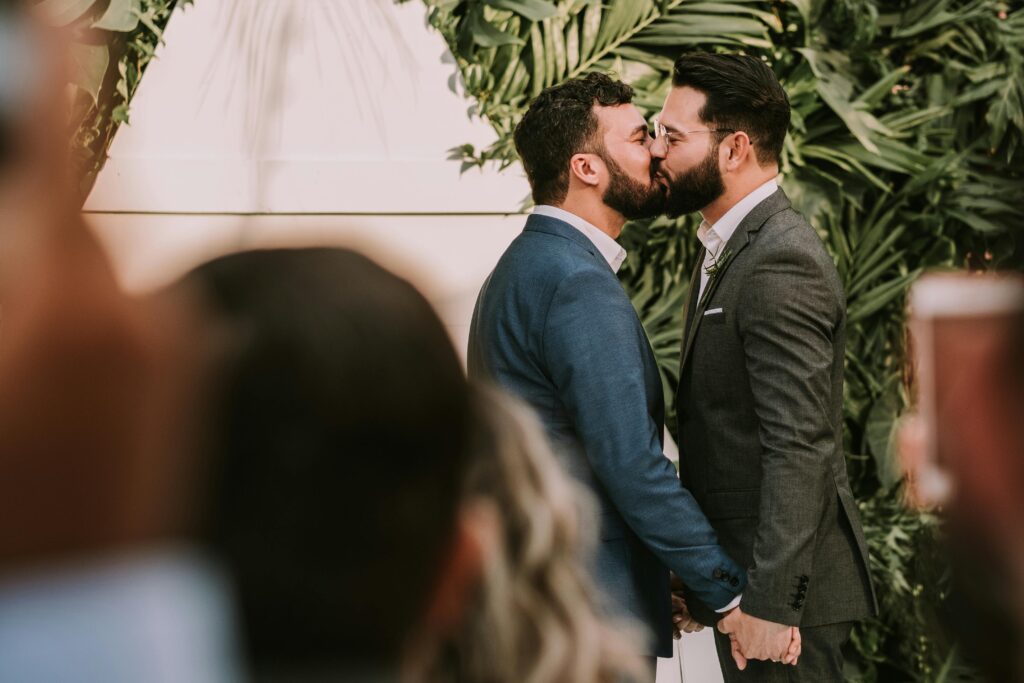In 2015, Obergefell v. Hodges, a landmark decision by the US Supreme Court legalized same-sex marriage in all 50 states. This pivotal ruling marked a significant victory for LGBTQ+ rights advocates and underscored the evolving landscape of marriage equality in the country. However, the journey towards full recognition and acceptance of same-sex unions on a state-level is still going on. Even though states are prohibited from banning gay marriage (thanks to Obergefell), if it is ever overturned, their inactive anti-gay laws will spring back into effect. We discuss this dilemma and address some FAQs below.
The landmark case legalizing gay marriage in all 50 states
The Obergefell case was decided in 2015. The case that brought the question up to the US Supreme Court was regarding the legality of same-sex marriage. The facts of the case involved 14 same-sex couples and two men whose same-sex partners had passed away. They lived in states (Michigan, Kentucky, Ohio, and Tennessee) where the law (at the time) said that marriage can only be between a man and a woman. These people wanted to get married and/or wanted their marriages, which were legally performed in other states where gay marriage was legal, to be recognized in their home states. The court sided with the 14 same-sex couples and changed US history forever!
The majority legal opinion in Obergefell on why prohibiting gay marriage in states is unconstitutional
The Obergefell case majority opinion states that laws preventing same-sex marriage are unconstitutional. The justices explained that the Constitution protects the right to marry for everyone, including same-sex couples. Specifically, they explained that the Constitution guarantees certain fundamental freedoms, like the right to marry, under the Due Process and Equal Protection Clauses of the Fourteenth Amendment.
Some of the historical precedents referenced by the court to support their decision included:
- Loving v. Virginia (1967): A unanimous Supreme Court decision that invalidated any bans on interracial unions and stated that “one of the vital personal rights essential to the orderly pursuit of happiness by free men.” Obergefell v. Hodges, 576 U.S. 644, 664 (2015).
- Zablocki v. Redhail (1978): This Supreme Court case held the right to marry was burdened by a law prohibiting fathers who were behind on child support from marrying. Id.
- Turner v. Safley (1987): The Supreme Court, in this case, held that the right to marry was abridged by regulations limiting the privilege of prison inmates to marry. (In plain English: even prisoners have a right to marry). Id.
What happens if Obergefell is overturned?
We’ve all heard about the recent overturning of Roe v. Wade, which ended the ban on prohibiting abortion bans. So, it may get some people thinking, what happens if Obergefell is also overturned? Well, good news and bad news. The good news is that, luckily, many states created their own state laws to allow same-sex marriage, so in those states, gay marriage would continue to be legal. However, the bad news is that in states that still have dormant state-level same-sex marriage bans, then same-sex marriage would become illegal in those states again.
The scarier news is that Roe v. Wade was also overturned on a 14th Amendment analysis (and remember, Obergefell was also decided on an analysis of the 14th Amendment). However, an expert in the area who spoke with Time Magazine explained the differentiation between the two cases: “Unlike Roe v. Wade, Obergefell wasn’t simply decided on liberty grounds, it was also decided on equality grounds.” In other words, Roe v. Wade was overturned based on the interpretation of the word “liberty,” as was the case in Obergefell, as well. However, Obergefell also relied on equal protection among people, which Roe v. Wade did not.
Which states have state-level laws permitting same-sex marriages?
Obergefell is a Supreme Court ruling in which it made any law banning gay marriage unconstitutional. However, this is on the federal level, so many states’ anti-gay marriage laws simply went dormant at this time, but most were not repealed. So, if Obergefell were to be overturned, these dormant laws would spring back into action if they were not repealed. According to Time Magazine, there are 35 states that have “dormant” or “inactive” anti-gay marriage laws that would go back into effect should Obergefell be overturned. On the flipside, there are 15 states (plus D.C.) that would still allow gay marriage should Obergefell be overturned.
According to the National Conference of State Legislatures (NCSL), here are the states where same-sex marriage would likely still be legal because there is no statutory or state constitutional ban:
- Connecticut
- District of Columbia
- Delaware
- Illinois
- Maine
- Maryland
- Massachusetts
- Minnesota
- Nevada
- New Jersey
- New Hampshire
- New Mexico
- New York
- Rhode Island
- Vermont
What about California?
Notably missing from the above list is California. According to CNN, in 2024, the people of California will vote on whether to officially make same-sex marriage explicitly permitted in CA’s state constitution. This vote gives Californians a chance to get rid of a rule from 2008 (Proposition 8) that says a marriage is between a man and a woman in California. The only way to get rid of Prop 8 is by having the voters decide to do so in the 2024 general election.
Nevada was the first state to pave the path towards equality in 2020
In 2020, Nevada became the first state to explicitly include gay marriage in it’s state constitution, solidifying the legality of gay marriage in its state, regardless of the overturn of Obergefell. Under Section 21 of the Nevada State Constitution, it states “The State of Nevada and its political subdivisions shall recognize marriages and issue marriage licenses to couples regardless of gender.” This language replaced the words that said marriage was “between a man and a woman” which effectively barred gay marriage should Obergefell be overturned. This is great news for Nevada residents who fear the overturn of Obergefell as it creates a safety net for same-sex couples under the state’s law.
The current public opinion on gay marriage in the US
The trend towards equality is evident in a recent Gallup Poll from May of 2023, where 71% of respondents stated that gay marriage should be valid. This is up 11% from 2015 where just 60% of respondents said gay marriage should be valid (2015 was the year gay marriage was legalized in all 50 states by Obergefell). Even more shocking is the response from 1996 where only 27% of respondents believed gay marriage should be valid.
In addition, the Gallup Poll also asked respondents what if they believed same-sex relations were morally acceptable (ignoring the legal aspect of the issue) and only 64% of people said same-sex relations were morally acceptable.
Final Thoughts
In conclusion, the Obergefell case of 2015 marked a monumental shift in American legal history by legalizing same-sex marriage in all 50 states. The ruling was grounded in the fundamental principles of equality and liberty outlined in the US Constitution’s Fourteenth Amendment. Referencing historical precedents such as Loving v. Virginia, Zablocki v. Redhail, and Turner v. Safley, the US Supreme Court affirmed the right of same-sex couples to marry, overturning state-level bans that deemed such unions unlawful.
However, the potential overturning of Obergefell raises concerns about the fate of same-sex marriage, particularly in states with dormant anti-gay marriage laws. While some states have actively legislated in favor of same-sex marriage, others, like California, still grapple with outdated restrictions. Nevada stands as a beacon of progress, having amended its state constitution in 2020 to explicitly recognize and protect the right to same-sex marriage. The ongoing struggle for marriage equality underscores the importance of continued advocacy and legal protection for LGBTQ+ rights across the nation.
Frequently Asked Questions (FAQs) about Gay Marriage in the US
Here are some frequently asked questions regarding same-sex marriage:
Q: Is same-sex marriage legal in all 50 states?
A: Yes, following the landmark Obergefell v. Hodges ruling in 2015, same-sex marriage is legal nationwide.
Q: What was the Obergefell v. Hodges case about?
A: Obergefell v. Hodges was a Supreme Court case that addressed the constitutionality of state bans on same-sex marriage. The plaintiffs sought legal recognition of their marriages in states where same-sex marriage was prohibited.
Q: What happens if Obergefell v. Hodges is overturned?
A: If Obergefell were to be overturned, it would likely invalidate same-sex marriages in states with dormant laws that ban gay marriage in about 35 states.
Q: How does Obergefell legalize gay marriage, from a legal standpoint?
A: It is a decision from the US Supreme Court, which creates federal law and places guidelines on states for how they make their laws. The Obergefell case essentially said it is against the US Constitution to ban gay marriage in state law (and states must follow the US Constitution)

Nicole Sheehey is the Head of Legal Content at HelloPrenup, and an Illinois licensed attorney. She has a wealth of knowledge and experience when it comes to prenuptial agreements. Nicole has Juris Doctor from John Marshall Law School. She has a deep understanding of the legal and financial implications of prenuptial agreements, and enjoys writing and collaborating with other attorneys on the nuances of the law. Nicole is passionate about helping couples locate the information they need when it comes to prenuptial agreements. You can reach Nicole here: [email protected]


0 Comments